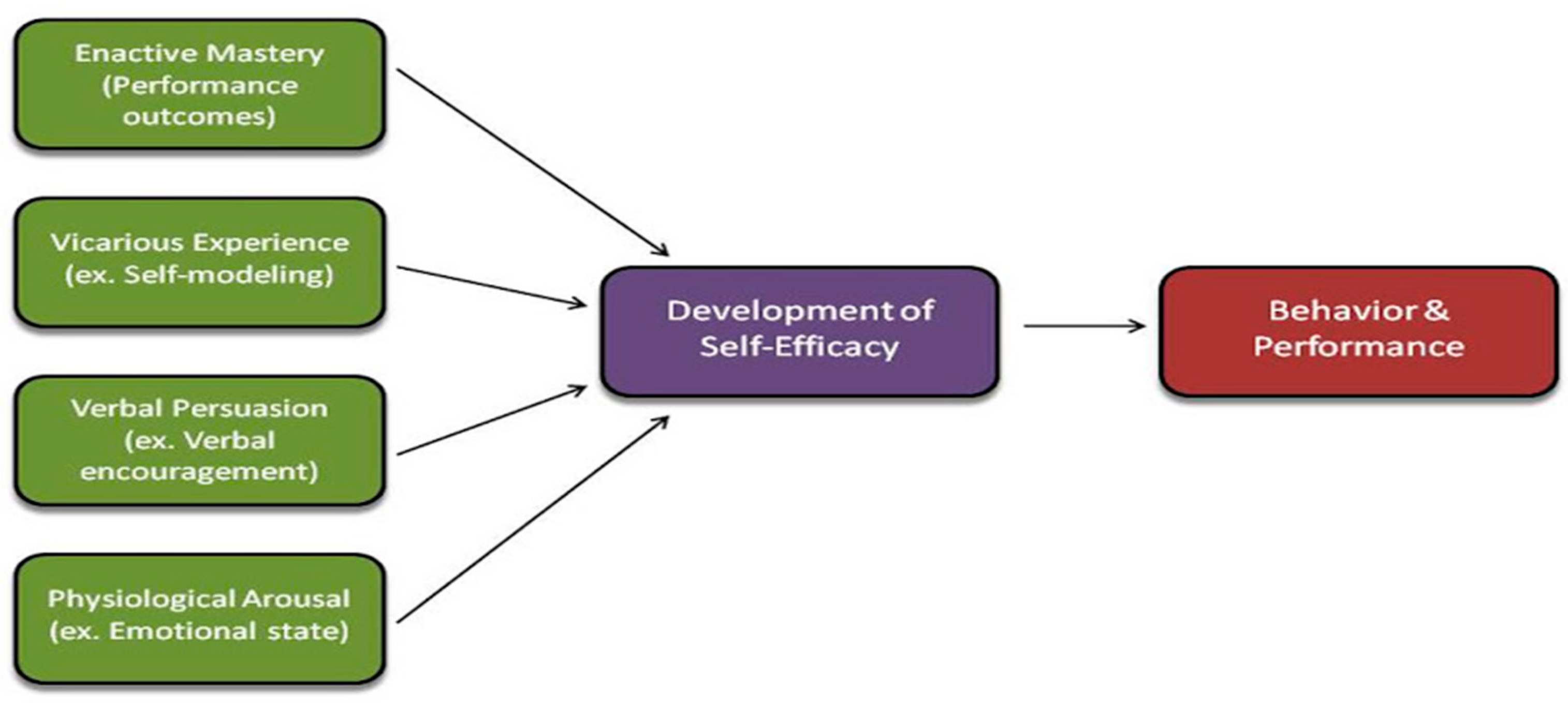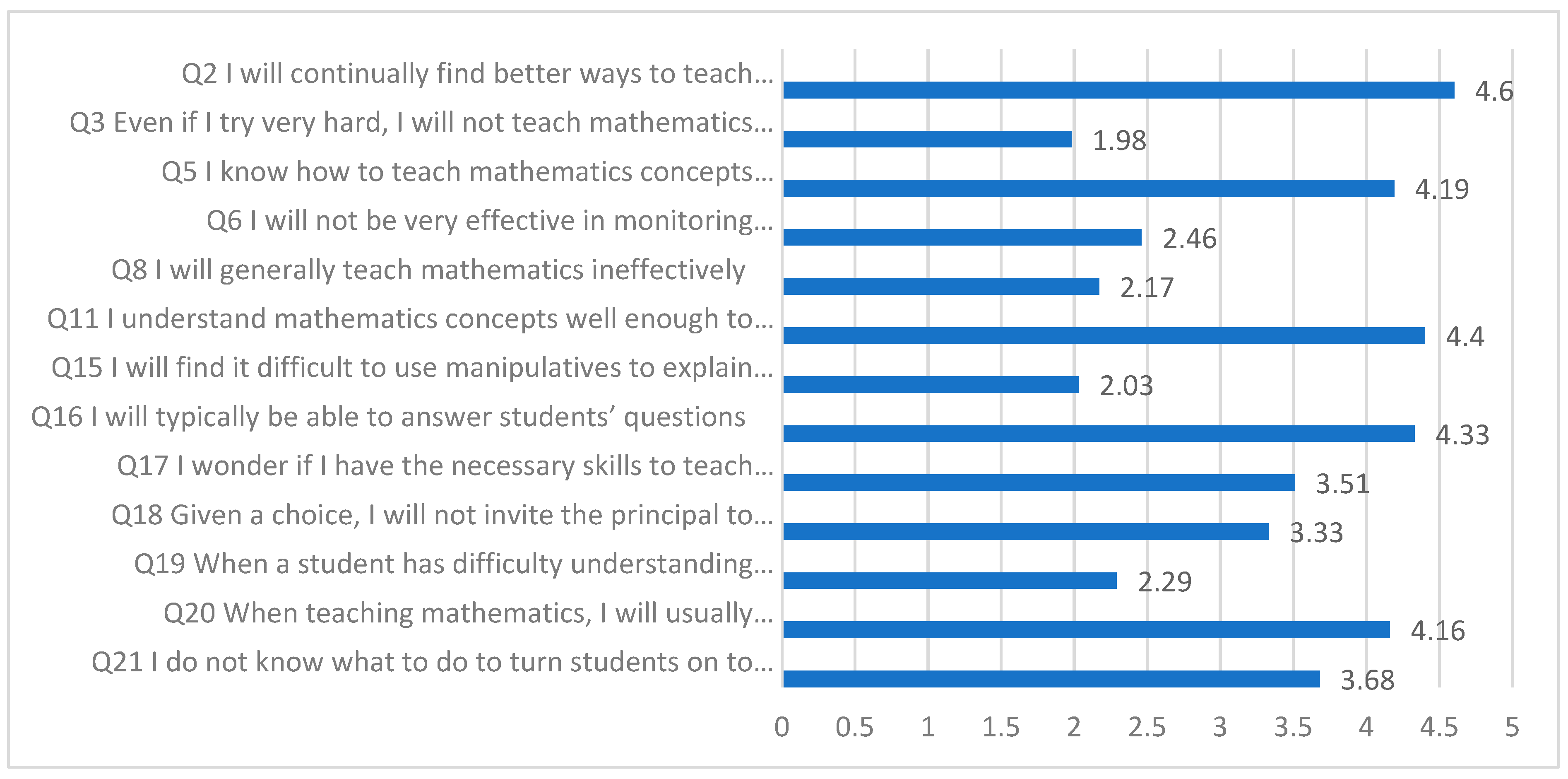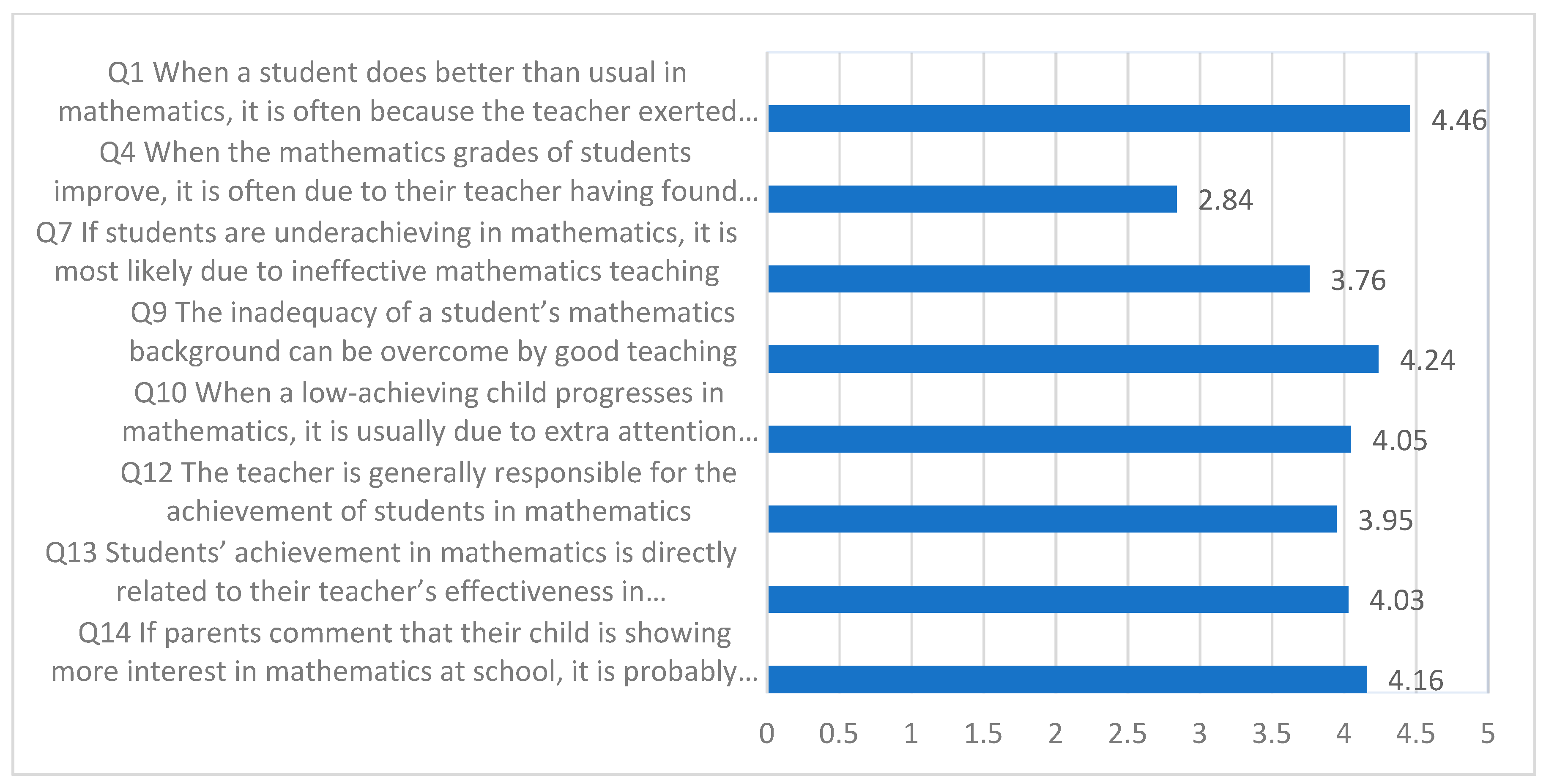An Investigation of High School Preservice Teachers’ Self-Efficacy in Teaching Mathematics
Abstract
1. Introduction
1.1. Conceptualizing Teacher Self-Efficacy
1.2. Preparation of Preservice Mathematics Teachers
1.3. Framework: The Self-Efficacy Theory (SET)
2. Materials and Methods
2.1. Research Paradigm, Approach, and Design
2.2. Population, Sample, and Sampling Technique
2.3. Data Collection Instruments, Analysis, and Ethics
3. Results
4. Discussion
5. Conclusions
6. Recommendation
- Professional Development: Teacher education programs should offer targeted professional development programs focused on enhancing mathematics teaching skills and self-efficacy. This could include workshops on effective teaching strategies, use of manipulatives, and addressing diverse student needs in mathematics.
- Mentorship Programs: Teacher education programs should implement formal mentorship initiatives that connect preservice teachers with seasoned mathematics educators who can offer crucial support. Through this initiative, mentors will provide direction, impart good teaching practices, and assist preservice teachers in overcoming problems, augmenting their self-efficacy.
- Foster a growth mindset culture within teacher education programs: Teacher education programs should continuously emphasize that teaching skills can be developed over time. Thus, highlighting success stories and providing mentorship opportunities can help alleviate self-doubt and encourage preservice teachers to embrace challenges in their teaching practice.
- Self-Reflection Practices: Preservice teachers should be encouraged to engage in self-reflection regarding their teaching beliefs and practices. This can help them identify areas for improvement and build a growth mindset.
- Provide access to resources and tools: This can help preservice teachers effectively engage students in mathematics. This includes training on the use of manipulatives, technology, and other instructional materials that can enhance understanding and interest in the subject.
Author Contributions
Funding
Institutional Review Board Statement
Informed Consent Statement
Data Availability Statement
Conflicts of Interest
References
- Enochs, L.G.; Smith, P.L.; Huinker, D. Establishing factorial validity of the mathematics teaching efficacy beliefs instrument. Sch. Sci. Math. 2000, 100, 194–202. [Google Scholar] [CrossRef]
- Byrd, K.O.; Giles, R.M. Preservice Teachers’ Self-Efficacy for Teaching Mathematics. SRATE J. 2023, 32, 1–11. [Google Scholar]
- Alghamdi, A.A. Exploring early childhood teachers’ beliefs about STEAM education in Saudi Arabia. Early Child. Educ. J. 2023, 51, 247–256. [Google Scholar] [CrossRef]
- Swars, S.; Hart, L.C.; Smith, S.Z.; Smith, M.E.; Tolar, T. A longitudinal study of elementary pre-service teachers’ mathematics beliefs and content knowledge. Sch. Sci. Math. 2007, 107, 325–335. [Google Scholar] [CrossRef]
- Lee, C.W.; Walkowiak, T.A.; Nietfeld, J.L. Characterization of mathematics instructional practises for prospective elementary teachers with varying levels of self-efficacy in classroom management and mathematics teaching. Math. Educ. Res. J. 2017, 29, 45–72. [Google Scholar] [CrossRef]
- Olawale, B.E.; Hendricks, W. Mathematics teachers’ self-efficacy beliefs and its relationship with teaching practices. EURASIA J. Math. Sci. Technol. Educ. 2024, 20, em2392. [Google Scholar] [CrossRef]
- Trice, A.D.; Ogden, E.D. Correlates of mathematics anxiety in first-year elementary school teachers. Educ. Res. Q. 1986, 11, 3–4. [Google Scholar]
- Giles, R.; Byrd, K.; Bendolph, A. An investigation of elementary preservice teachers’ self-efficacy for teaching mathematics. Cogent Educ. 2016, 3, 1160523. [Google Scholar] [CrossRef]
- Zee, M.; Koomen, H.M.Y. Teacher Self-Efficacy and Its Effects on Classroom Processes, Student Academic Adjustment, and Teacher Well-Being: A Synthesis of 40 Years of Research. Rev. Educ. Res. 2016, 86, 981–1015. [Google Scholar] [CrossRef]
- Morris, D.; Usher, E.; Chen, J. Reconceptualizing the Sources of Teaching Self-Efficacy: A Critical Review of Emerging Literature. Educ. Psychol. Rev. 2017, 29, 795–833. [Google Scholar] [CrossRef]
- Olawale, B.E.; Hendricks, W. Self-efficacy and Academic Performance of Mathematics Students in a South African University during the COVID-19 Pandemic. Int. J. Math. Educ. Sci. Technol. 2022, 53, 573–581. [Google Scholar] [CrossRef]
- Korkmaz, F.; Ünsal, S. Developing the Scale of Teacher Self-Efficacy in Teaching Process. Eur. J. Educ. Res. 2016, 5, 73–83. [Google Scholar] [CrossRef]
- Bandura, A. Self-efficacy. In Encyclopedia of Human Behavior; Academic Press: New York, NY, USA, 1994; pp. 71–81. [Google Scholar]
- Kahyaoğlu, M.; Fire, S. Opinions of primary school teacher candidates on their professional self-efficacy. Kastamonu J. Educ. 2007, 15, 73–84. [Google Scholar]
- Bandura, A.; Adams, N. Analysis of Self-Efficacy Theory of behavior change. Cogn. Ther. Res. 1997, 1, 287–310. [Google Scholar] [CrossRef]
- Bandura, A. Social Foundations of Thought and Action: A Social Cognitive Theory; Prentice Hall: Englewood Cliffs, NJ, USA, 1986. [Google Scholar]
- Tschannen-Moran, M.; Hoy, A.W.; Hoy, W.K. Teacher efficacy: Its meaning and measure. Rev. Educ. Res. 1998, 68, 202–248. [Google Scholar] [CrossRef]
- Avery, L.M.; Meyer, D.Z. Teaching science as science is practiced: Opportunities and limits for enhancing preservice elementary teachers’ self-efficacy for science and science teaching. Sch. Sci. Math. 2012, 112, 395–409. [Google Scholar] [CrossRef]
- McLaughlin, D. Investigating preservice teachers’ self-efficacy through Saturday science. J. Coll. Sci. Teach. 2015, 45, 77–83. [Google Scholar] [CrossRef]
- Matthews, S.; Boden, M.; Visnovska, J. Engaging Pre-Service Non-Specialist Teachers in Teaching Mathematics Using Embodied Technology Tools. In Paper presented at the Annual Meeting of the Mathematics Education Research Group of Australasia (MERGA); ERIC: Auckland, New Zealand, 2018. [Google Scholar]
- Olawale, B. Teacher Quality and Learner Achievement in South African Schools. In Academic Performance—Students, Teachers and Institutions on the Stage; IntechOpen: London, UK, 2023; pp. 1–18. [Google Scholar]
- Olawale, B.E. Impact of Pre-Service Teacher Education Programme on Mathematics Student Teachers’ Teaching Practices during School Experiences. Educ. Sci. 2024, 14, 762. [Google Scholar] [CrossRef]
- Morris, A.; Hiebert, J.; Spitzer, S. Mathematical knowledge for teaching in planning and evaluating instruction: What can pre-service teachers learn? J. Res. Math. Educ. 2009, 40, 491–529. [Google Scholar] [CrossRef]
- Hine, G.S. Strengthening pre-service teachers’ mathematical content knowledge. J. Univ. Teach. Learn. Pract. 2015, 12, 1–16. [Google Scholar] [CrossRef]
- Shulman, L.S. Knowledge and teaching: Foundations of the new reform. Harv. Educ. Rev. 1987, 57, 1–22. [Google Scholar] [CrossRef]
- Shulman, L.S. Knowledge and teaching: Foundations of the new reform. In Learners and Pedagogy; SAGE: London, UK, 1999; pp. 61–77. [Google Scholar]
- Darling-Hammond, L. Doing What Matters Most: Investing in Quality Teaching; National Commission on Teaching & America’s Future, Kutztown Distribution Center: Kutztown, PA, USA, 1997. [Google Scholar]
- Ball, D.L.; Hill, H.; Bass, H. Knowing mathematics for teaching: Who knows mathematics well enough to teach third grade, and how can we decide? Am. Educ. 2005, 29, 14–46. [Google Scholar]
- Harris, K.L.; Jensz, F. The Preparation of Mathematics Teachers in Australia: Meeting the Demand for Suitably Qualified Mathematics Teachers in Secondary Schools; The University of Melbourne: Melbourne, Australia, 2006. [Google Scholar]
- Norton, S. How deeply and how well? How ready to teach mathematics after a one year program? Math. Educ. Spec. Educ. 2010, 12, 65–84. [Google Scholar]
- Miller, K.W.; Davidson, D.M. What makes a secondary school science and/or mathematics teacher “highly qualified”? Sci. Educ. 2006, 15, 56–59. [Google Scholar]
- Olawale, B.E. Democratic Citizenship in Mathematics Teachers’ Preparation in South African Universities, Alice. Ph.D. Thesis, University of Fort Hare, Dikeni, South Africa, 2021. [Google Scholar]
- Olawale, B.E. Democratic citizenship in mathematics teacher preparation in South African universities: Contradictions in theory and practice. Int. J. Pedagog. Teach. Educ. 2022, 6, 126–139. [Google Scholar] [CrossRef]
- Shulman, L.S. Those who understand: Knowledge growth in teaching. Educ. Res. 1986, 15, 4–14. [Google Scholar] [CrossRef]
- Ebby, C.B. Learning to teach mathematics differently: The interaction between coursework and fieldwork for preservice teachers. J. Math. Teach. Educ. 2000, 3, 69–97. [Google Scholar] [CrossRef]
- Shulman, L. Knowledge and Teaching: Foundations of the New Reform; Jossey Bass: San Francisco, CA, USA, 2004. [Google Scholar]
- Liston, D.P.; Zeichner, K.M. Reflective teaching and action research in preservice teacher education. J. Educ. Teach. 1990, 16, 235–254. [Google Scholar] [CrossRef]
- Zeichner, K. Rethinking connections between campus courses and field experiences in college- and university-based teacher education. J. Teach. Educ. 2010, 61, 89–99. [Google Scholar] [CrossRef]
- Schunk, D.H.; DiBenedetto, M.K. Self-Efficacy and Human Motivation; Elsevier: Amsterdam, The Netherlands, 2021; Volume 8, pp. 153–179. [Google Scholar] [CrossRef]
- Bandura, A. Self-Efficacy: The Exercise of Control; Freeman: New York, NY, USA, 1997. [Google Scholar]
- Pajares, F. Overview of Social Cognitive Theory and Self-Efficacy. 2002. Available online: http://people.wku.edu/richard.miller/banduratheory.pdf (accessed on 23 August 2024).
- Park, Y.S.; Konge, L.; Artino, A.R., Jr. The positivism paradigm of research. Acad. Med. 2020, 95, 690–694. [Google Scholar] [CrossRef]
- Creswell, J.W.; Creswell, J.D. Research Design: Qualitative, Quantitative, and Mixed Methods Approaches, 5th ed.; SAGE: Los Angeles, CA, USA, 2018. [Google Scholar]
- Croucher, S.M.; Cronn-Mills, D. Experimental Design. In Understanding Communication Research Methods; Routledge: London, UK, 2021; pp. 249–263. [Google Scholar] [CrossRef]
- Creswell, J.; Clark, V.P. Designing and Conducting Mixed Methods Research; Sage: New York, NY, USA, 2018. [Google Scholar]
- Hartas, D. Educational Research and Inquiry: Qualitative and Quantitative Approaches; Bloomsbury Publishing: London, UK, 2015. [Google Scholar]
- Iliyasu, R.; Etikan, I. Comparison of quota sampling and stratified random sampling. Biom. Biostat. Int. J. 2021, 10, 24–27. [Google Scholar] [CrossRef]
- Arrington, N.M. Enhancing preservice teachers’ self-efficacy for teaching diverse learners: Capturing young students’ attention through a read-a-loud and music. J. Scholarsh. Teach. Learn. 2023, 23, 76–95. [Google Scholar] [CrossRef]
- Özben; Kilicoglu, E. The development process of classroom teacher candidates for teaching mathematics: Self-efficacy, anxiety and professional belief. Particip. Educ. Res. 2021, 8, 129–146. [Google Scholar] [CrossRef]
- Woodcock, S.; Sharma, U.; Subban, P.; Hitches, E. Teacher self-efficacy and inclusive education practices: Rethinking teachers’ engagement with inclusive practices. Teach. Teach. Educ. 2022, 117, 103802. [Google Scholar] [CrossRef]
- Dogutas, A. Self-efficacy beliefs of teacher candidates on readiness to teaching profession at a university in Turkey. Igdir Univ. J. Soc. Sci. 2016, 9, 1–24. [Google Scholar]
- Frazier, R.; Bendixen, L.D.; Hoskins, W. Exploring the role of self-efficacy in prospective teachers’ career decision-making. J. Ethnogr. Qual. Res. 2019, 13, 261–271. [Google Scholar]
- Zuya, H.E.; Kwalat, S.K.; Attah, B.G. Pre-Service Teachers’ Mathematics Self-Efficacy and Mathematics Teaching Self-Efficacy. J. Educ. Pract. 2016, 7, 93–98. [Google Scholar]
- Ekmekci, A.; Corkin, D.; Papakonstantinou, A. The relationship between teacher related factors and mathematics teachers’ educational beliefs about mathematics. In Proceedings of the 42nd Annual Meeting of the Research Council on Mathematics Learning, Las Vegas, NV, USA, 26–28 February 2015. [Google Scholar]
- Johnson, A.L.; Lockee, B.B. Self-efficacy research in online learning. In Self-Efficacy in Instructional Technology Contexts; Springer Nature: New York, NY, USA, 2018; pp. 3–13. [Google Scholar] [CrossRef]



| Attribute | Variables | Freq (f) | Percent (%) |
|---|---|---|---|
| Gender | Female | 42 | 66.7 |
| Male | 21 | 33.3 | |
| Age | 19–20 | 01 | 1.6 |
| 21–22 | 52 | 82.5 | |
| 23–24 | 08 | 12.7 | |
| 25 and above | 02 | 3.2 | |
| Subject Combination | Mathematics + Physical Sciences | 39 | 61.9 |
| Mathematics + Life Sciences | 24 | 38.1 | |
| Total | 63 | 100 |
| Question Number | Item | Standard Deviation (SD) | Rank | |
|---|---|---|---|---|
| Q2 | “I will continually find better ways to teach mathematics” | 4.60 | 0.794 | 1 |
| Q3 * | “Even if I try very hard, I will not teach mathematics as well as I will do most subjects” | 1.98 | 0.314 | 13 |
| Q5 | “I know how to teach mathematics concepts effectively” | 4.19 | 0.060 | 4 |
| Q6 * | “I will not be very effective in monitoring mathematics activities” | 2.46 | 0.533 | 9 |
| Q8 * | “I will generally teach mathematics ineffectively” | 2.17 | 0.661 | 11 |
| Q11 | “I understand mathematics concepts well enough to be effective in teaching high school mathematics” | 4.40 | 0.370 | 2 |
| Q15 * | “I will find it difficult to use manipulatives to explain to students why mathematics works” | 2.03 | 0.606 | 12 |
| Q16 | “I will typically be able to answer students’ questions” | 4.33 | 0.047 | 3 |
| Q17 * | “I wonder if I have the necessary skills to teach mathematics” | 3.51 | 0.413 | 7 |
| Q18 * | “Given a choice, I will not invite the principal to evaluate my mathematics teaching” | 3.33 | 0.867 | 8 |
| Q19 * | “When a student has difficulty understanding mathematics concepts, I will usually be at a loss as to how to help the student understand it better” | 2.29 | 0.631 | 10 |
| Q20 | “When teaching mathematics, I will usually welcome student questions” | 4.16 | 0.144 | 5 |
| Q21 * | “I do not know what to do to turn students on to mathematics” | 3.68 | 0.644 | 6 |
| Question Number | Item | Standard Deviation (SD) | Rank | |
|---|---|---|---|---|
| Q1 | “When a student does better than usual in mathematics, it is often because the teacher exerted a little extra effort” | 4.46 | 0.600 | 1 |
| Q4 | “When the mathematics grades of students improve, it is often due to their teacher having found a more effective teaching approach” | 2.84 | 0.833 | 8 |
| Q7 | “If students are underachieving in mathematics, it is most likely due to ineffective mathematics teaching” | 3.76 | 0.542 | 7 |
| Q9 | “The inadequacy of a student’s mathematics background can be overcome by good teaching” | 4.24 | 0.489 | 2 |
| Q10 | “When a low-achieving child progresses in mathematics, it is usually due to extra attention given by the teacher” | 4.05 | 0.237 | 4 |
| Q12 | “The teacher is generally responsible for the achievement of students in mathematics” | 3.95 | 0.660 | 6 |
| Q13 | “Students’ achievement in mathematics is directly related to their teacher’s effectiveness in mathematics teaching” | 4.03 | 0.367 | 5 |
| Q14 | “If parents comment that their child is showing more interest in mathematics at school, it is probably due to the performance of the child’s teacher” | 4.16 | 0.382 | 3 |
| Variable | Female (n = 42) | Male (n = 21) | ||
|---|---|---|---|---|
| SD | SD | |||
| Preservice mathematics teaching self-efficacy in teaching mathematics | 3.96 | 0.77 | 3.54 | 0.69 |
| Preservice mathematics teaching outcome expectancy in teaching mathematics | 4.18 | 0.67 | 3.98 | 0.80 |
Disclaimer/Publisher’s Note: The statements, opinions and data contained in all publications are solely those of the individual author(s) and contributor(s) and not of MDPI and/or the editor(s). MDPI and/or the editor(s) disclaim responsibility for any injury to people or property resulting from any ideas, methods, instructions or products referred to in the content. |
© 2024 by the authors. Licensee MDPI, Basel, Switzerland. This article is an open access article distributed under the terms and conditions of the Creative Commons Attribution (CC BY) license (https://creativecommons.org/licenses/by/4.0/).
Share and Cite
Hendricks, W.; Olawale, B.E.; Saddiq, K. An Investigation of High School Preservice Teachers’ Self-Efficacy in Teaching Mathematics. Educ. Sci. 2024, 14, 1262. https://doi.org/10.3390/educsci14111262
Hendricks W, Olawale BE, Saddiq K. An Investigation of High School Preservice Teachers’ Self-Efficacy in Teaching Mathematics. Education Sciences. 2024; 14(11):1262. https://doi.org/10.3390/educsci14111262
Chicago/Turabian StyleHendricks, Winston, Babawande Emmanuel Olawale, and Khalid Saddiq. 2024. "An Investigation of High School Preservice Teachers’ Self-Efficacy in Teaching Mathematics" Education Sciences 14, no. 11: 1262. https://doi.org/10.3390/educsci14111262
APA StyleHendricks, W., Olawale, B. E., & Saddiq, K. (2024). An Investigation of High School Preservice Teachers’ Self-Efficacy in Teaching Mathematics. Education Sciences, 14(11), 1262. https://doi.org/10.3390/educsci14111262






